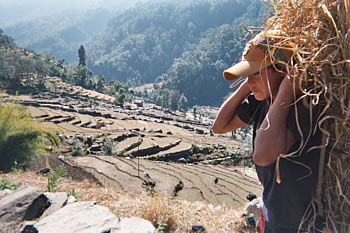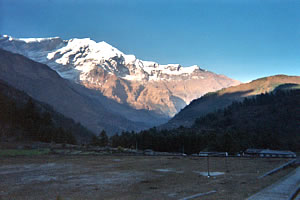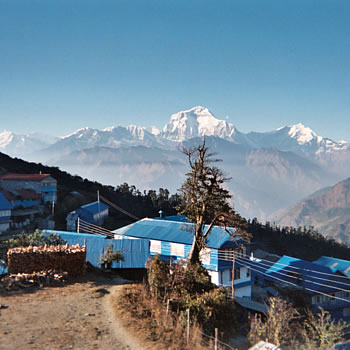| |
Thursday,
November 20
From Tatopani to Ghorepani
The
next morning I awoke early, in the darkness, under the roof
of the lodge. I had noticed the night before that you could
see out through cracks in the roof, between the slate slabs
that served as shingles. I got up and dressed. I didn't have
an alarm clock with me so I asked Rob (ever organized, always
prepared Rob) to wake me if I hadn't knocked on his door by
6:15. Walking down to the cottage, I passed a water faucet,
one that was used by the porters to wash their clothes, etc.
There was a clothesline in the yard of the cottage. But in
the early morning dim, I saw to men on the stone walk there
by the faucet skinning and slaughtering a goat. They looked
like they were in a hurry to get it done. I knocked on Rob's
door and he said good morning. He and Andy had slept well
for the first time in many nights. Andy is a fidgety person
by his own admission. When he is awake, he can't keep still
or quiet, and when he is asleep, he snores loudly (according
to Rob).
Back to my room I went to
pack, a ritual that I had practiced daily. Rolling and stuffing
the sleeping bag into its bag. Folding the liner. I took my
bathing suit off the strange semi-blocked opening in the wall,
and packed it. My towel went into the zipper compartment on
the bottom of the pack. I put on my sock liners and a fresh
pair of socks and folded the clothes I wasn't wearing. Cold
Mountain went in. The bag of toothpaste, ointments, and bandages
I hoped I wouldn't need. Once the big pack was finished, the
one Lila would carry, I put my water bottle holder on my belt
and put my jacket into the day pack I would carry. I grabbed
my trekking poles and headed down the steep, rickety wooden
stairs to the restaurant and ordered coffees for everyone.
About the time Rob and Andy arrived, the coffee did also.
After porridge and coffee,
I had some quality time down at the cottage with the luxurious
western bathroom facilities all to myself. It was a good start
to a very long day. Each day had brought its own trekking
challenges, but this one would remind us of the first day.
The trek was from Tatopani (1190 m) up to Ghorepani (2750
m) , from which we would climb up to Poon Hill (3193 m) before
dawn the following day. It was a very steep climb, in some
ways reminiscent of the first day from Jomosom (2710 m) to
Muktinath (3800 m). Although this wouldn't entail the extent
of altitude affects that we suffered in Muktinath, we would
climb 1560 m that day, whereas on the Muktinath trek we ascended
only 1090 m.
The trail was not in desolate
windblown country, but instead, steep grades and stone steps
through the forest and terraced farmland of green mountainsides.
There were farmhouses visible far up the mountainsides. There
were little wooden bridges, just a few planks over streams.
A lot of water was moving around us, and there were beautiful
waterfalls on the mountains opposite the trail. In some of
the small villages we passed though, cherry trees were in
blossom, and other flowering trees. There were water buffalo
and happy lazy dogs. (In general, the dogs seemed to be healthy,
happy and well cared for in Nepal.) On some of the terraces,
wheat had been planted and was sprouting, the first leaves
glowing green. There were birds cheerfully trilling from the
trees. And everywhere white mountains rising from behind the
nearer green ones.

We trekked up steps and at
the top would be a grade and at the top of that a turn with
more steps and it was up and up again and up some more and
then up. In the shade of the trees it was cool but as the
day progressed, it was t-shirt warm in the sun. It was the
kind of trekking where you have to find your own sustainable
pace and stay with it, and not worry about falling behind
or getting ahead of the others (except when you get to a fork
in the trail and don't know which way to go so you have to
wait for Krishna). I used my poles again, and a very deliberate
rhythm of feet and poles and breathing, step after step after
step, hour upon hour. The rhythm turned into a little chant
in my head: Tatopani, Ghorepani, thik cha, thik cha. (Thik
cha means I am fine, or something like that.)
I started to compose a poem
about the stones of Nepal.
The stones of Nepal
Silent and strong
Bend down before you
To support you and lift you up...
There are so many stones that
have been laid by human hands. They always seem to be there
when you need them. The streets of the villages are paved
with them. When the trail gets too steep, it becomes stone
steps instead of a grade. And
on this day we climbed hundreds of them.
I gave Andy some decongestant
gellcaps, but he was in the worst day of the cold, and it
couldn't have come on a worse day of the trek. He was struggling,
stopping often and losing his steam quickly after each start.
He lagged farther and farther behind. I trekked with him some
of the time, and as the temperature increased he sweated profusely.
It was a miserable day for him.
We stopped for lunch at Chithra,
a beautiful lodge run by Belgians, with spectacular views.
I had a peanut butter sandwich and pan fried cornbread. While
we sat in the sun drinking lemon Fanta and waiting for Andy
to catch up, I took off my boots to let them and my socks
dry. (Dry feet are happy feet.) A fly was circling around
and landed on one of my socks. Flies are attracted to my feet,
I told Rob. That's a bad sign. Usually flies are attracted
either to dead things or dung. Of which did they think my
feet smelled, I wondered.
When we had been in Pokhara,
Rob and I had walked the back streets looking for an orphanage
that he had seen on his previous visit. He was interested
in opportunities to contribute to worthwhile charities in
Nepal. The Belgians who ran the lodge at Chithra seemed to
have a good one. They ran a school there in the remote mountains,
which taught girls as well as boys (the government schools
teach only boys, and only for a few grades). They also fund
a traveling nurse who visits the villages, providing basic
health care services. And they are developing a program to
provide employment after the education of the children.
It was a very long day, but
that afternoon we finally approached the first buildings of
Ghorepani. Beside the trail were a couple of 20ish young Nepali
men sitting on a flat rock beside the trail. One was wearing
a UCLA baseball cap. They called us over, and one handed me
a plastic folder that held hand lettered pages. They were
the Maoists, and the pages described their cause and said
that we had passed from the part of Nepal controlled by the
government to the part controlled by the rebels. And accordingly
we were required to make a contribution to their cause. I
thought it said 1000 rupees, which is about $13. So I handed
the folder to Rob and Andy and I gave the Maoists 1000 rupees.
They accepted it without question and gave me a receipt (part
of which I filled out, name and home country, etc.), so if
ever asked by another Maoist, I would not have to pay again.
Rob and Andy read more carefully and paid 2000 rupees each,
but Rob insisted on lecturing them briefly on what he disagreed
with in their manifesto. Freedom does not come from the barrel
of a gun, he told them. I'm not sure how much they understood,
but they took the money and gave receipts. The Maoists seemed
like nice guys, but we knew they had friends with guns not
far away.
It had been a wonderful trek
that day, one I could appreciate as it happened. Moments of
peace and quiet, especially when I had trekked alone, going
at my own pace, picking the easiest grade, the smallest steps.
There were delicious moments of head silence to just smell
Nepal and feel it and hear it and see it. Nepal poured in
through my senses. You feel like you have the whole world
beneath you here, I remember thinking.
After 7+ hours and the encounter
with the Maoists, we arrived about 2:15. The guest house in
Ghorepani was unique in that it had something I had seen in
none of the others: a wood heater in the common room. It was
made out of a metal drum with a metal box welded on top (where
pans could sit) and had a water pipe running through it. The
whole thing sat on a square wooden platform covered with sheet
metal and the chimney pipe ran up through the guest room above,
which was coveted on cold nights. The prospect of sitting
on the benches surrounding the heater that evening was delightful.
We took our packs up to our rooms on the second floor. Instead
of outside balconies to reach the rooms, this place had an
interior hallway, and instead of a carpet down the middle
of the floor, it had a thickly padded carpet, padded as if
a few inches of foam rubber were under it. Strange, I thought,
but Rob said it probably reduced the noise downstairs. Mine
was a corner room with windows on two sides right on the main
street of town. Fortunately, there were curtains. Krishna
and his brothers had a room downstairs. Rob had been craving
a Mars bar, and I saw that they sold them in the lobby/common
room where the heater was located, so I bought him one. He
savored it.
The shower was downstairs.
I had had the first shower in Kalopani, so it was Rob's turn
to go first, then Andy's. I waited, towel, soap and shampoo
in hand, at the entrance to the hallway onto which the shower
room opened, enjoying a cup of Nepali tea. I was protecting
my place in line. After we arrived, two older Israeli women
arrived. I talked to one of them as we waited. They had refused
to give the Maoists any money. I think they were coming from
the opposite direction from us so entered Ghorepani on the
other side of town and had encountered different Maoists.
My shower was still plenty
warm when I turned it off. But the Israeli woman said it was
cold when she got in after me. Puzzling, but it made me think
about the whole warm shower phenomenon. There were very few
people on the trail compared to a couple of years before,
but still there were far more than there would be hot showers
for. Most guest houses that had warm water at all used solar
systems, and in late afternoon only a few showers would be
warm, there being no reheating potential. On one level, the
guides and trekkers competed to be first to the destination
so they could get a warm shower. As much as I appreciated
one myself, it seemed absurd to hurry through the trekking
part to get to the guesthouse part of the day. Of course,
there was a lot more to it. But it did make me realize that
we seemed to be hurrying. In fact, Krishna himself had shortened
our trek by a day before we even left Pokhara.
After showers and a leisurely
lunch, our towels hung on the clothes rack attached to the
ceiling near the heater downstairs, we headed out for a walk.
There was an inn up the hill, the front yard of which was
perfectly located for a wonderful view of the mountains. I
wondered why we would need to climb Poon Hill the next day.
We looked out over the buildings of the town, all of which
were painted blue and white. It certainly was unusual.
Below us was a school yard
with a volleyball court. Some Nepali guys were down there
playing and Krishna said we should join them. We went down
and Krishna and Rob played for a time, but it was a strange
game. They didn't play for points or serve from behind the
line, and nobody rotated position. Lila joined in and was
one of the best players. Andy had fun from the sidelines making
fun of his dad's play.

There was a little shop downstairs
on the street, under the heated room of the guest house. I
bought some Hob Nobs, made in UK. I'd never had them before,
and they were exorbitantly expensive. But still, I thought
they would be appreciated the next morning. We planned to
leave the hotel before dawn, at 5:30, to hike up to Poon Hill
for the sunrise. Unless there were clouds.
It got cold very quickly once the sun disappeared behind a
mountain. Back in the guest house, Rob faced the prospect
of another night in a small room with Andy. Noting that the
guest house had a telephone service, he called ahead to the
Hotel Nirvana in Pokhara to reserve a third room for when
we returned the next day. That evening we were gathered around
the heater, sitting on benches, waiting for dinner. The two
Maoist guys that we had met came in to make sure all the guests
had receipts. We had ours. They discovered that the Israeli
women had none, and a prolonged attempt to get money from
them began. It seemed to get less friendly by the minute.
Krishna quietly told me to tell Rob to keep quiet. The women
claimed not to understand, and the Maoists asked Andy to be
a translator, but he said he didn't speak French. Actually
the women spoke English well and were just using their Yiddish
as a ruse. But the Maoists told them not to try to go to Poon
Hill the following day, and that they were not welcome there.
But the women didn't pay. We lingered around the heater that
night. Once in bed, I pulled the curtain back to look out
on the quiet street. During the night I awoke and looked up
and the stars and a planet were rising. But later, in the
early morning, I couldn't see any. I wondered if this meant
it was cloudy so there would be no hike up to Poon Hill.
At night the air of the village
filled with smoke, mostly from cooking fires I think, like
other places we had been.
The
next day
this
travelogue is part of the subside
travelzine
about bookshelf
links contact
submit
|
|


